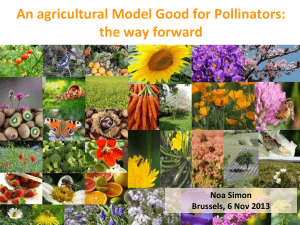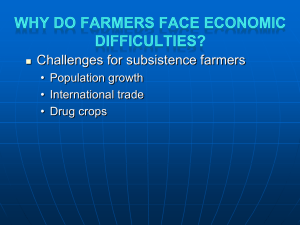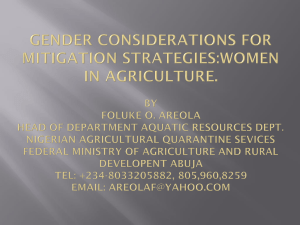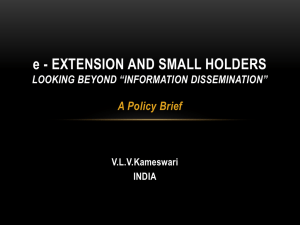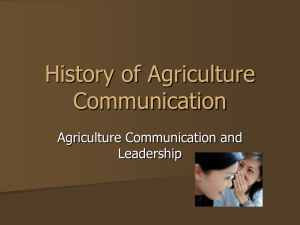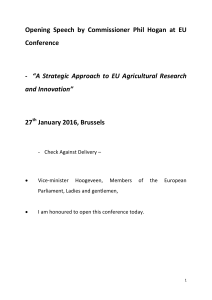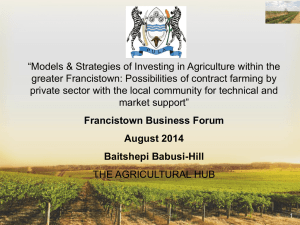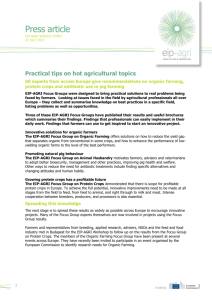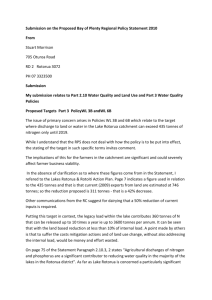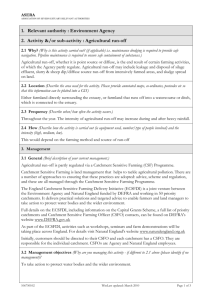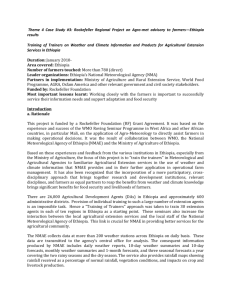Position Description Document (download)
advertisement
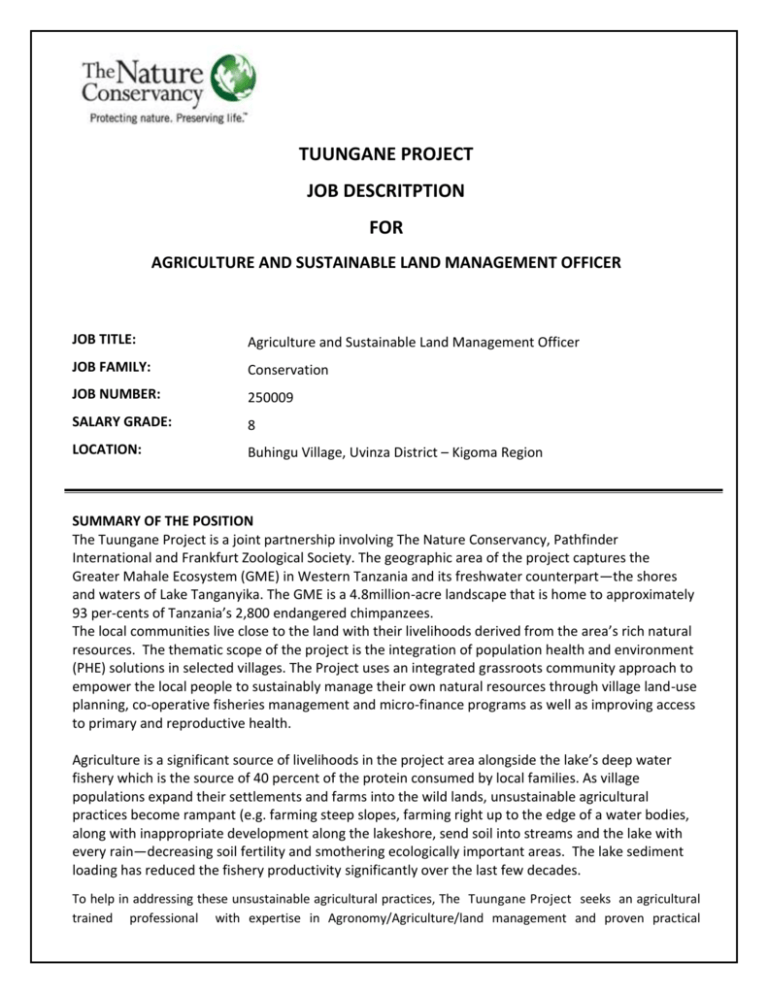
TUUNGANE PROJECT JOB DESCRITPTION FOR AGRICULTURE AND SUSTAINABLE LAND MANAGEMENT OFFICER JOB TITLE: Agriculture and Sustainable Land Management Officer JOB FAMILY: Conservation JOB NUMBER: 250009 SALARY GRADE: 8 LOCATION: Buhingu Village, Uvinza District – Kigoma Region SUMMARY OF THE POSITION The Tuungane Project is a joint partnership involving The Nature Conservancy, Pathfinder International and Frankfurt Zoological Society. The geographic area of the project captures the Greater Mahale Ecosystem (GME) in Western Tanzania and its freshwater counterpart—the shores and waters of Lake Tanganyika. The GME is a 4.8million-acre landscape that is home to approximately 93 per-cents of Tanzania’s 2,800 endangered chimpanzees. The local communities live close to the land with their livelihoods derived from the area’s rich natural resources. The thematic scope of the project is the integration of population health and environment (PHE) solutions in selected villages. The Project uses an integrated grassroots community approach to empower the local people to sustainably manage their own natural resources through village land-use planning, co-operative fisheries management and micro-finance programs as well as improving access to primary and reproductive health. Agriculture is a significant source of livelihoods in the project area alongside the lake’s deep water fishery which is the source of 40 percent of the protein consumed by local families. As village populations expand their settlements and farms into the wild lands, unsustainable agricultural practices become rampant (e.g. farming steep slopes, farming right up to the edge of a water bodies, along with inappropriate development along the lakeshore, send soil into streams and the lake with every rain—decreasing soil fertility and smothering ecologically important areas. The lake sediment loading has reduced the fishery productivity significantly over the last few decades. To help in addressing these unsustainable agricultural practices, The Tuungane Project seeks an agricultural trained professional with expertise in Agronomy/Agriculture/land management and proven practical experience in agricultural extension to be responsible in implementing the agriculture component of the Tuungane project’s Land use/Terrestrial strategy. BASIC QUALIFICATIONS BSc or MSc degree in Agronomy/Agriculture and/or Land Management with a minimum of 5 years’ of practical experience in agriculture extension work in rural areas or equivalent combination of education and experience. Excellent knowledge of the Tanzanian Agricultural policies and programs and proven knowledge and experience of Tanzanian agricultural extension system and working with farmers, herders, extension officers and Local Government Authorities Experience in community mobilization, coordinating and conducting trainings for farmers and other resources user such as herders. Good organizational and ability to deal with people from a variety of cultural background. Good listener and communicator in both written and spoken Swahili and English Experience using common software applications such as Word, Excel, PowerPoint, Web browsers, etc. Experience in working in remote rural areas. Strong monitoring and project reporting skills ESSENTIAL FUNCTIONS: The Agriculture and Sustainable Land Management Officer will be responsible in implementing the agriculture component of the Tuungane project’s Land use/Terrestrial strategy with the following overarching objectives:1. Reduce sedimentation of Lake Tanganyika’s critical fish breeding and nursey sites from inappropriate farming practices in lake shore project villages 2. Increase agricultural yields through adoption of sustainable agriculture practices and systems and hence contribute to food security at household and community levels S/he will specifically collaborate with Government Agriculture Extension Officers to facilitate farmers to adopt sustainable agricultural practices and systems that reduce lake sedimentation in critical fish breeding and nursery sites in the project area as well as facilitating farmers increase agricultural yields without necessarily increasing farmlands into natural forest areas. S/he will also perform the following specific functions: Train farmers on conservation agriculture and sustainable land management for increased agricultural yield and reduced soil erosion. Train livestock keepers on appropriate livestock husbandry so as to avoid overgrazing and expansion of grazing into new forest areas. Liaise with the Government Veterinary Service for provision of veterinary services to the livestock keepers in the project area villages. Facilitate establishment of Agriculture demonstration plots for training farmers on appropriate farming practices including the use of terracing and agro-forestry for increase agricultural yields and reduced soil erosion Foster cross-site learning among farmers and the general community on sustainable agriculture practices Support farmer’s groups on the development of common services such as input supply, marketing of their products, etc. Prepare work plan and budgets and take lead in the implementation of the agricultural component of the project Land use/ Terrestrial strategy Perform any other duties as may be assigned by the Project Manager REQUIRED KNOWLEDGE AND SKILLS: Agriculture expertise with 5 years’ experience in Agriculture extension or equivalent combination of education and experience. Ability and willingness to work Government Agriculture Extension Officers, rural communities and Local Government authorities Ability to work as part of multi-disciplinary and cultural team Good listener and communicator Familiarity with the Tanzanian Agriculture policy and programs, agricultural extension systems and local government structures Knowledge of current trends and best practices in agriculture Experience in training farmers and livestock keepers. Completing tasks independently with respect to timeline(s) Managing time and diverse activities under deadlines while delivering quality results Excellent communication skills via written, spoken and graphical means in English and Kiswahili language Physically fit and ability to walk over hilly rough terrain ORGANIZATIONAL COMPETENCIES ORGANIZATIONAL COMPETENCIES Pushes for excellence. Establishes challenging goals for self and others to drive performance in support of the Conservancy’s Accountability mission. Rewards behavior that achieves these standards and is for Outcomes aligned with the organization’s mission/ values. Takes action to address performance problems in a timely and appropriate manner. Builds Builds or adapts organizational structures to accomplish the Organizational mission and to improve performance. This includes Capability reorganizing organizational systems, structures, processes, Collaboration & Teamwork Communications Courage & Decisiveness Flexibility & Innovation Influences for Results Open to Learning procedures, communication channels or reporting relationships. With the Conservancy’s strategic filter in mind, determines who can contribute, gets the right people involved, and builds bench strength for the future. Shows a willingness to put the needs and goals of a global organization before personal/local/departmental needs. Works with others across organizational boundaries. Makes decisions, sets priorities, and allocates resources to help the organization as a whole achieve results. Effectively expresses messages verbally and in writing. Actively listens to others. Fosters open exchange of issues. Is timely with information. Makes decisions and stands by them. Makes timely decisions even under pressure and when lacking complete information. Has the courage to modify decisions and admit why and how they were wrong. Flexible to changing circumstances. Takes innovative approaches towards work. Takes calculated risks and makes dependable decisions in the fact of uncertainty. Achieves results by persuading, convincing, or influencing others. Adapts approach to the individual or group and knows how and when to use complex influence strategies. Uses success stories and passion for the mission to generate enthusiasm and support. Versatile learner and committed to self-improvement. Employs strengths effectively. Willingly shares knowledge with others. Seeks coaching on areas needing improvement. Adjusts behavior/performance as needed. Views mistakes as learning opportunities. Understands the basics of our business. Knows how local job Organizational relates to the big picture & contributes to the overall strategy. Awareness Knows how/why things work inside TNC. Easily moves through internal networks and channels for success. COMPLEXITY/PROBLEM SOLVING: Understanding and ability to work across multiple projects’ strategies with several variables, set realistic deadlines, and manage a timeline. Interpret guidelines and analyze factual information to adapt or modify processes in response to changing circumstances. Duties may require non-routine analysis, research and follow-through. DISCRETION/LATITUDE/DECISION-MAKING: Work independently without requiring detailed management review of general work. Act in supervisor’s stead when instructed. RESPONSIBILITY/OVERSIGHT –FINANCIAL & SUPERVISORY: Financial responsibility may include working within a budget to complete project’s planned activities, negotiating and contracting with vendors, assisting with budget development, and meeting fundraising targets. May supervise support staff and/or volunteers, interns, or temporary staff. COMMUNICATIONS/INTERPERSONAL CONTACTS: Communication and presentation skills - ability to persuasively convey integrated Population, Health and Environment (PHE) projects and programs to diverse groups including policy and decision markers, donors, board members, the public and others. Solicit project support through clear written communications, including proposal writing. Work and communicate with a wide range of stakeholders – community leaders and members, vendors, local and national government leadership, donors, and others. WORKING CONDITIONS/PHYSICAL EFFORT: Willingness to travel and work flexible hours. Ability to work under stress during peak workload periods. Work requires only minor physical exertion and/or physical strain. Work environment involves only infrequent exposure to disagreeable elements. BENEFITS The Nature Conservancy offers competitive compensation, excellent benefits, and flexible work policies and a collaborative work environment. We also provide professional development opportunities and promote from within. As a result, you will find a culture that supports and inspires conservation achievement and personal development, both within the workplace and beyond. The Nature Conservancy is an Equal Opportunity Employer HOW TO APPLY: To apply for this position, please submit a resume/CV and cover letter to Africa@tnc.org subject line: AGRICULTURE AND SUSTAINABLE LAND MANAGEMENT OFFICER. Applications must be submitted by Friday, October 2nd, 2015 to be considered.
